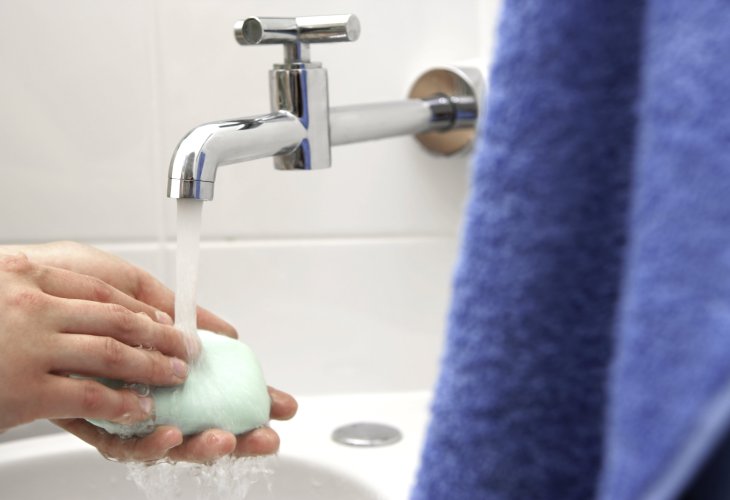Jewish Law
Cleanliness and Holiness: How Hygiene Is Part of Jewish Life
Learn how handwashing, bathing, and keeping clean are part of everyday mitzvot in Jewish tradition and halacha
- Eran Ben Yishai
- |Updated

It’s no secret that in many parts of the world, especially in earlier centuries, personal hygiene wasn’t a high priority. People in farming communities often didn’t bathe regularly, and streets were not always kept clean. Even the burial of the deceased could be delayed, which we now know increases the risk of spreading disease.
By the late 1800s, science began to show how closely health and hygiene are connected. Simple actions like washing hands and cleaning living spaces started to become more common. But for the Jewish people, many of these principles had already been part of halacha, Jewish law for thousands of years.
While the Torah’s mitzvot weren’t given just for physical benefit, we now know they help not only the soul, but the body as well. Let’s explore how hygiene is deeply rooted in Jewish tradition.
The Mitzvah of Washing Hands
Jewish law gives great importance to washing hands throughout the day:
Upon waking in the morning, we wash our hands and say a blessing (Shulchan Aruch, Laws of Morning Conduct, 4:1).
After leaving the bathroom even without relieving oneself or exiting a bathhouse, handwashing is required because of the impure spiritual energy associated with those places (Shulchan Aruch 4:18).
Before eating bread (over which we say the blessing “HaMotzi”), we must wash both hands even if they look clean (Rambam, Laws of Blessings 6:1).
After meals, we wash our hands again to clean off leftover food and this is known as Mayim Achronim (“final waters”) and is considered an obligation (Shulchan Aruch Orach Chaim 181:1).
We also wash hands after cutting nails, removing shoes, touching feet or parts of the body usually covered, or after marital relations and contact with a deceased person (Shulchan Aruch 4:18-19).
Bathing as a Mitzvah
Today, we shower with ease. But in the past, bathing required effort like hauling water from wells or rivers. Despite this, Judaism has always emphasized cleanliness:
In honor of Shabbat, it is a mitzvah to bathe: “One should wash their face, hands, and feet in hot water on Friday,” and ideally the whole body. It’s also customary to cut nails and groom before Shabbat (Shulchan Aruch Orach Chaim 260:1).
The Midrash tells a sweet story about Hillel the Elder, who called bathing “a mitzvah.” When asked how, he explained that if statues of kings are cleaned for honor, surely humans created in Hashem’s image, deserve even more care (Leviticus Rabbah 34:3).
The Talmud adds: A person should wash their face, hands, and feet daily to honor their Creator (Shabbat 50b).
Men who experienced a nocturnal emission (known in halacha as a “baal keri”) would immerse in a mikvah. Although not required today, the custom still exists to do so or at least to pour over oneself nine kabin (about 12 liters) of water (Rambam, Laws of Prayer 4:5-6).
Cleanliness after using the bathroom is also a big focus in halacha. Great rabbis like the Chafetz Chaim, the Ben Ish Chai, and others stressed washing the area well, not just with paper, but also water if possible. This is because leftover waste blocks proper prayer and is not respectful of the body.
The Laws of Family Purity
Jewish law also teaches the importance of purity between husband and wife. After a woman experiences her menstrual cycle, she and her husband separate for a period of time. When she completes her “seven clean days,” she immerses in a mikvah (ritual bath). This is part of the mitzvah of family purity, a deeply spiritual practice that also promotes hygiene and respect.
Burying the Dead Without Delay
Modern science teaches us that when a person passes away, the body begins to decompose and can become a source of illness. The Torah already instructed Jews to bury the dead as soon as possible. Delaying burial is a Torah prohibition and causes distress to the soul of the departed (Rambam, Laws of Sanhedrin 15:10).
Keeping Public Spaces Clean
Today, many are becoming more aware of the importance of clean streets, parks, and public spaces. We hear slogans like “The world is everyone’s room,” reminding us that we all share responsibility. But the Torah already prohibited littering. Rabbi Zvi Spitz wrote that based on the Talmud (Bava Kamma 6a), it is forbidden to throw trash in public areas even if it’s not dangerous because it’s damaging to the community and the environment (Mishpatei HaTorah, Part 1, Section 20).

